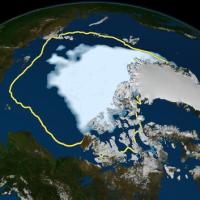
Capitalism Has Failed the Environment
This past September saw the lowest amount of Arctic summer sea ice recorded in 33 years of measurement. Climate change experts warn that the Arctic could be ice-free as early as 2020, 30 years earlier than the last estimate published in 2007. A complete loss of summer sea ice has devastating consequences for not only the fragile Arctic ecosystem, but also the entire global population.
The loss of the Arctic ice cap nearly half a century earlier than predicted suggests we are far closer to a point of no return and have less time to act than we thought just a few years ago. If we are to seriously tackle global warming we must challenge the logic that got us into this mess in the first place—capitalism and its inherent need for profits at the expense of humanity and the environment that sustains it.
Double the warming
Global warming, caused by human activity, has already warmed the entire planet by nearly 1.5 degrees Fahrenheit. But, the warming is not uniform across the planet.
Disproportionately affected are highly sensitive regions like the Arctic, where the average air temperature has risen twice as fast as the global average. The retreating sea ice is exposing the dark ocean, which absorbs far more sunlight than the reflective ice, further destabilizing our climate system.
“What happens in the Arctic doesn’t stay in the Arctic”
Melting sea ice isn’t just bad for polar bears. Declining levels of sea ice affects food production (Washington Post, 1/14/2012), sea level rise (NY Times, 9/19/2012), and the likelihood of extreme weather events. Extreme weather events, like the frankenstorm Sandy that pummeled the east coast in late October, are predicted to increase in frequency as more energy from the sun is absorbed by the Arctic Ocean (NOAA News, 10/19/2012).
The solution
What should be a wake up call has instead turned into a race to extract more fossil fuels from the now ice-free areas of the Arctic (see Justice issue 84).
Capitalism’s unrelenting quest for more profits and economic expansion comes at the expense of human life and environmental sustainability. The capitalist leaders tell us we must not act because of the economic costs. We must dismiss this false dichotomy and recognize it for what it is, a glaring indictment of the economic system of capitalism. If capitalism can’t afford to take action against the biggest threat facing global civilization, then this is a system that does not meet the needs of humanity and must be overthrown and replaced with one that does.
The mistake of current environmental activism is to limit its demands to the confines of the capitalist system. All the ideas that have been proposed—cap and trade, carbon taxes, commodifying land, air and trees to incentivize the system to make the right decisions—have resulted in practically nothing, except 30 years of kicking the can down the road and 30 years closer to climate catastrophe.
The way forward to stop this madness can be found in the pages of history. Mass movements have been the only force for progress. All the great movements of the past century, the civil rights, women’s, labor, LGBTQ, and environmental movements, involved massive amounts of people and linked the common struggles within the movements.
We must reject the false dichotomy of the environment versus jobs and instead link the struggle for environmental sustainability with the demand for jobs. A combination of labor demands with the knowledge of what is needed to reduce our ecological footprint could create a movement powerful enough to seriously challenge this system. The call for a green jobs program to put millions back to work and retool our infrastructure would meet the demands of both labor and the environment. If we are serious about halting global warming and mitigating the effects that have already come to pass, we should focus our efforts on building this coalition.


Be the first to comment